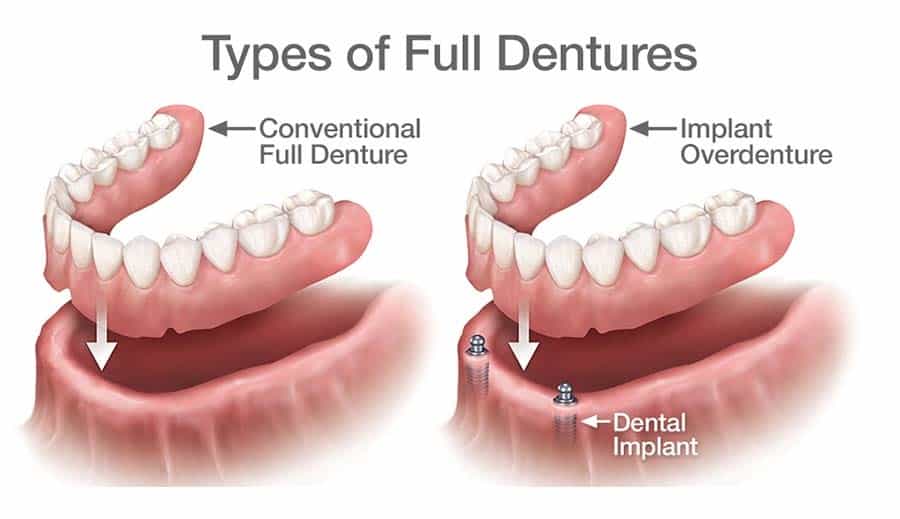To the disinterested observer, every set of false teeth may look like every other set of false teeth. If you’re the one missing your teeth and look for options, though, you’re hardly disinterested. You should know all sets of false teeth are not created equal. One of the biggest differences that exist — and the biggest choice you get to make — is how your dentures will fit. On your gums? Or into your jaw?
Here’s what you need to know about conventional dentures (ones that sit on your gums) and implant-supported dentures (ones firmly rooted into your jaw) available from a dentist near you.
Conventional dentures vs. implant-supported dentures
| Conventional | Implant-supported |
| Conventional dentures rest on top of your gums and rub against them. Conventional dentures are removed at night, and cleaned outside your mouth. Because they rest on your gums, they are less secure and more prone to being loose or slipping while eating. | Implant-supported dentures do not rest on your gums. They are held in place by four or more implants that are embedded into the bone of your jaw. Implant-supported dentures stay in place permanently unless removed by your dentist for adjustment or repair. You clean them like natural teeth while they’re in your mouth. |
Are the differences important?
One of the most important implications of the difference between conventional and implant-supported dentures in Prince Albert is how they relate to the bone in your jaw. There are two perspectives on this to keep in mind: performance issues and health issues.
Performance-related issues
Because conventional dentures sit on your gums without anything other than suction (or in some cases depending on fit and the condition of your dentures, adhesive), they are prone to slipping and become loose as the shape of your gums and jaw changes over time. That slipping and looseness will produce sore spots on your gums. That slipping and looseness may also cause feelings of insecurity while speaking, laughing, eating, and chewing.
Health-related issues
Your gums and jaw are living tissue. When you have no natural teeth roots in your jaw, your jaw bone slowly resorbs or shrinks in the absence of stimulation. While you live without teeth and teeth roots, the shape and structure of your gums and jaw will change. That’s why the fit of dentures changes over time and one reason why they sometimes need to be re-lined, adjusted, and even replaced.
Dental implants solve that problem due to the unique properties of the implant materials themselves. Not only does the material (often titanium) bond secretly to the jaw bone, it actually stimulates the growth of new and healthy bone in your jaw. Simultaneously, then, implant-supported dentures are supported by your jaw bone and stimulate healthy growth in your jaw bone.
What’s the bottom line?
Conventional dentures are less expensive (up-front) and require less invasive procedures because there is no need to place implants in your jaw. From a cost perspective, though, keep in mind that conventional dentures will need to be adjusted, re-lined, and replaced as the shape of your jaw and gums changes over time. Taking into account the costs (in time, money and inconvenience) of those ongoing issues with conventional dentures, implant-supported dentures are obviously a wiser investment in the long term.
For people whose priority is obtaining the most secure and natural-feeling solution to tooth loss, implant-supported dentures are also the superior option. The stability of implant-supported dentures rooted in your jaw allow you to speak, laugh, sing, eat, and chew naturally without hesitation and without nervousness about your dentures slipping or falling out.
To learn more about your best options for dentures near you, reach out to a dentist for an assessment of your gums and personal priorities.
